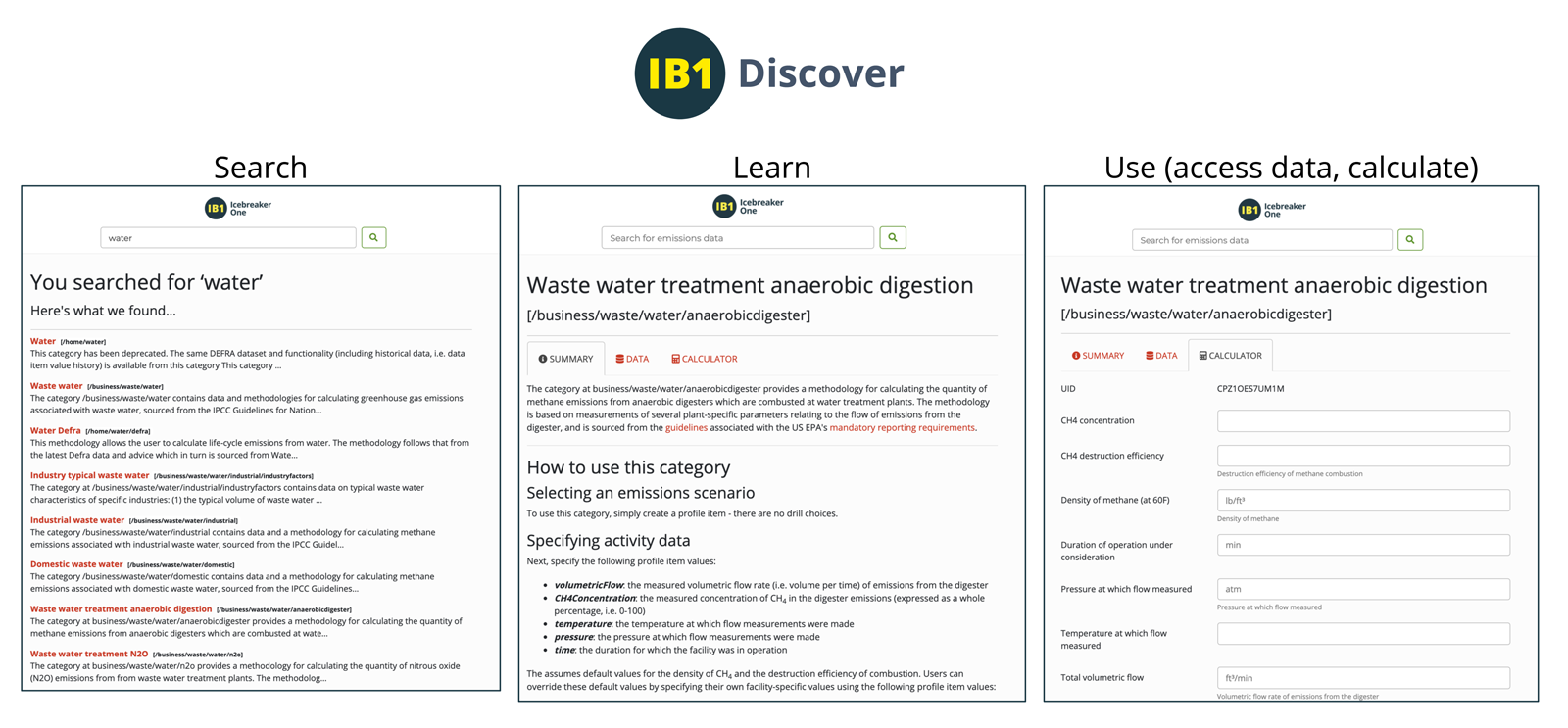Contact partners@ib1.org about Discover to get involved
We’ve developed an open-source, open API solution that automates the publishing of GHG (Greenhouse Gas), LCA (Lifecycle Analysis) and related standards in a manner that:
- Tracks provenance (source, date of publishing) to support assurance
- Is usable by humans (easy search, discovery, creates calculators automatically)
- Is usable by machines (auto-generates an API for machine integration)
- Supports both public models (free) and private-sector (paid for/licensed) models
We want to make it easy for anyone to discover, learn about and calculate the carbon footprint of anything and help to automate reporting for environmental sustainability. We have a prototype of this (screenshots above and live link below) that includes over 40,000 different models from planes to chickens, steel to water, electricity to gas.
The architecture is built and running, the systems are in place, the operating model is known. The underlying data is populated—it’s now out of date and needs to be refreshed. The solution has a web interface (for humans) and an API (for machines and SaaS solutions) to integrate.
What next?
We seek collaborators and funding to:
- Update the baseline Open Data and Open Models
We need to employ environmental data scientists to update the underlying Open Data and open methods so they are current. And, we want to develop a global expert community of practice around this. - Forge relationships with the originators of Open Data and Open Models (e.g. GHG Protocol)
We want to make it easy for the scientists and engineers doing the modelling to use the system to easily publish and maintain their work in a way that is immediately usable by anyone. Our collective action work is best addressed if we can collaborate to ‘crowdsource’ what everyone needs. - Open up access to proprietary models
We want to engage with commercial data modellers to open up access to their proprietary (non-Open) models to a bigger market (for which they can charge). Make it easy for people to find, access and use data and models, making a better ‘shop window’ for the whole market. - Maintaining and evolving the underlying development
We need to hire developers (code and UX) to help keep improving the systems and their usability. - Keep the whole thing (the bits that we provide) openly licensed and open to everyone to use
We are exploring a blend of philanthropic and commercial membership models to fund the service. We’re a non-profit. As an illustration, we would envisage a tiered membership model such as Startups, SME, Enterprise and free to individuals, universities and non-profits.
If you are interested in helping to develop or fund this work, please contact gavin@ib1.org.
Try it now: https://discover.ib1.org
How is a carbon footprint calculated?
Today, consultants and application developers who are trying to calculate the carbon footprint of things (for example, the use of electricity in the UK today, or the production of steel in China in 2019) have to search the web to discover who might have the data or methodology they want to use. Once found they usually have to download a spreadsheet (in a format specific to the source organisation) and translate it into something fit for purpose for their use. In some examples (e.g. flights between airports) the specific calculation is not a straightforward multiplication, but an algorithm that needs to be coded (e.g. flights must calculate the distance around the Earth as an arc). In some examples, it’s possible to get very specific (e.g. a specific make and model of car) whereas, in others, only general models exist (e.g. chicken farming across Asia).
For everyone involved, this is a specialist, time-consuming, and complex task. For developers, it is additionally complex as all these different areas need to be coded into one application and maintained. The same work has been being done over and over again for decades.
And, depending on the standards, or geography, the data or models change based on the latest science. This means everyone has to keep checking their sources to ensure that they are up to date.
This is very expensive, error-prone and is high-friction when it comes to innovation. We aim to commoditise this process.
Examples of the standards and frameworks covered (including some legacy initiatives)
Global Reporting Initiative
The Global Reporting Initiative (GRI) is a widely used sustainability reporting framework that sets out the principles and indicators that organisations can use …
DEFRA DECC
The Department for Environment, Food and Rural Affairs (DEFRA) is the UK Government department responsible for policy and regulations on the environment, food and rural affairs.
EPA GHG Mandatory Ruling
The US Environmental Protection Agency is a US government agency assigned with protecting the natural environment and safeguarding human health.
Carbon Reduction Commitment
The Carbon Reduction Commitment (CRC) Energy Efficiency Scheme (formally known as the Carbon Reduction Commitment) is the UK’s mandatory climate change and energy-saving scheme.
US E grid
The Emissions & Generation Resource Integrated Database (eGRID), published by the US Environmental Protection Agency, is the preeminent source of emissions data.
Embodied Inventory of carbon and energy – ICE
The Inventory for Carbon and Energy, or ICE, is a life cycle database representing a wide range of building and construction materials.
European Environment Agency
The EMEP/EEA air pollutant emission inventory guidebook (formerly referred to as the EMEP CORINAIR emission inventory guidebook) provides guidance on estimating emissions.
IPCC
The Intergovernmental Panel on Climate Change is one of the leading bodies for climate change assessment.
Greenhouse Gas Protocol
The Greenhouse Gas Protocol (GHGP) is a widely used international accounting tool for government and business leaders to understand, quantify, and manage greenhouse gas emissions.
Climate Leaders
Climate Leaders is a joint EPA-industry programme for reducing corporate impact on the environment.
Standard Assessment Procedure
The Standard Assessment Procedure (SAP) was developed by the UK Government’s Department for Environment, Food and Rural Affairs (DEFRA).

